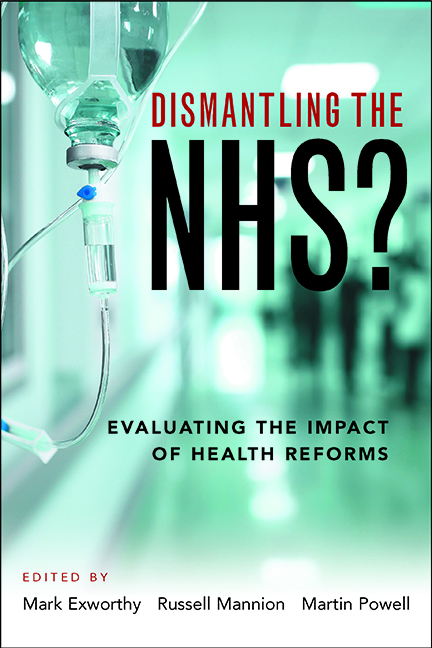eighteen - Never again? A retrospective and prospective view of English health reforms
Published online by Cambridge University Press: 05 April 2022
Summary
This Chapter takes retrospective and prospective perspectives on health reforms in English NHS. Retrospectively, we offer a precis of the preceding chapters, taking stock of the cumulative lessons from the significant body of evidence that has been presented in this book. Moreover, we seek to explain the ‘how and why’ of these reforms, using a specific conceptual model (multiple streams approach (MSA)). Prospectively, we consider the direction of health policy in the English NHS, and the research agenda which might inform this process.
What have we learnt so far?
We have presented 16 chapters of evidence across a diverse range of policy or thematic topics. Some of these (such as commissioning) have been standard topics in previous collections of evidence (Robinson and Le Grand, 1994; Le Grand et al, 1998; Mays et al, 2011) although the more recent emphasis has been upon ‘clinical’ commissioning (Chapter 8). Other topics are either novel to such collections of evidence (for example, equity, staffing and PPI: Chapters 12, 13 and 15) or are specific to the temporal context of the first and second decade of the twenty-first century (for example, fiscal austerity: Chapter 3). To organise the evidence (and to aid the reader), we grouped these chapters into three thematic sections: national health policy, commissioning and service provision, and governance.
National health policy
Over the past 25 years, the NHS has been the subject of a massive ‘natural experiment’ in reorganising, seeking to install the tenets of new public management (NPM). Specifically, this has entailed markets, competition, decentralisation and managerialisation. While the effects of these multiple reforms continue to play out, they have been overlain by the recent reforms since 2010. Archetypes such as the ‘bureaucratic’ NHS have been sedimented by newer ones (such as marketisation) which may distort and reinforce the effects of any single reform (Addicott et al, 2007).
The financial crisis of 2008 precipitated the conditions for fiscal austerity during the Coalition government (2010–15). Charlesworth and colleagues (Chapter 3) discuss the recent period of NHS austerity with reference to different sectors within the NHS, specific elements (such as agency pay), comparisons between the four nations of the UK, and wider international comparisons.
- Type
- Chapter
- Information
- Dismantling the NHS?Evaluating the Impact of Health Reforms, pp. 365 - 380Publisher: Bristol University PressPrint publication year: 2016



